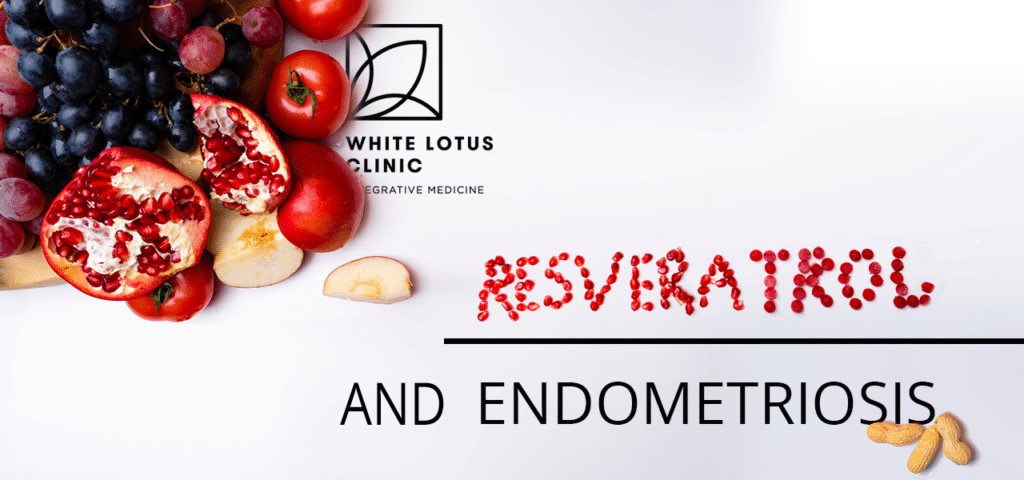Endometriosis is a painful and chronic condition that affects an estimated 10% of all women of reproductive age1. That said, despite years of research and several theories on the cause of endometriosis, it’s still not fully understood what causes it. What is clear, is that this condition is associated with inflammation, immune system dysfunction, and angiogenesis.
Angiogenesis is the development of new blood vessels. As a result, it’s an essential step in an endometrioma being able to both form, and survive within the body. Experimental studies done with a range of anti-angiogenic medications have demonstrated an ability to decrease endometrioma lesion size by reducing their blood supply1. This occurs by targeting some of the pro-angiogenic factors that are elevated in endometriosis. These include VEGF, IL-8, angiogenin and TNF- α1.
Looking at therapies that have anti-angiogenic properties could be a potential treatment option for endometriosis. In fact, one of the most studied natural options for endometriosis, Resveratrol, shows promise as an anti-angiogenic, anti-inflammatory, and anti-oxidant.
What is Resveratrol?
Resveratrol is a plant-derived polyphenol that’s found in many foods. It’s present in berries and peanuts, but most famously in grape skins, and therefore in red wine.
Note that Resveratrol has many interesting properties. It’s anti-inflammatory, anti-oxidant, anti-neoplastic, and anti-angiogenic. These properties make it of particular interest in endometriosis, where many of these systems aren’t working optimally.

How can it help with Endometriosis?
In animal models, studies show fascinating results when using Resveratrol on surgically induced endometriosis. One study found that Resveratrol-treated rats had significantly reduced endometrioma implant volumes compared to controls2. The study also found that in the Resveratrol treated rats, glutathione peroxidase enzyme activity increased2. This enzyme helps produce glutathione: the bodies’ main anti-oxidant that protects against damage.
A similar study—this one performed on mice—found that Resveratrol supplementation inhibited the process of new blood vessel growth. As a result, endometriomas growth rate was reduced, which led to a smaller lesions compared to the control group3.
Another study found that the Resveratrol treatment in mice actually reduced inflammatory cytokines that are associated with angiogenesis to the same extent as Lupron—a common medication used to treat endometriosis4.
Although most studies are done on animal models, we do have evidence of Resveratrol reducing pain scores in women. One study looked at the use of Resveratrol in women who failed to get pain relief with the use of an oral contraceptive pill5. It found that adding in Resveratrol treatment led to significant pain reduction. In fact, 82% of the women reported complete resolution of their pain after 2 months of use5!
Key Takeaways
- Angiogenesis is the development of new blood vessels. It’s an essential step in an endometrioma being able to both form, and survive within the body.
- One of the most studied natural options for endometriosis, Resveratrol, shows promise as an anti-angiogenic, anti-inflammatory and anti-oxidant.
- In animal models, Resveratrol treatment reduced the process of new blood vessel growth, reduced the growth rate of endometriomas, and reduced inflammatory markers to a similar extent as Lupron.
- Resveratrol has been found to reduce pain scores in women on the birth control pill.
Next Steps
- Read more about endometriosis here.
- If you have endometriosis and are looking for new treatment options, book an appointment with Dr. Kelly Clinning.
References
- Rocha A, Reis F, Taylor R. Angiogenesis and Endometriosis. Obstet Gynecol Int. 2013;2013:1-8. doi:10.1155/2013/859619
- Yavuz S, Aydin N, Celik O, Yilmaz E, Ozerol E, Tanbek K. Resveratrol successfully treats experimental endometriosis through modulation of oxidative stress and lipid peroxidation. J Cancer Res Ther. 2014;10(2):324. doi:10.4103/0973-1482.136619
- Rudzitis-Auth J, Menger M, Laschke M. Resveratrol is a potent inhibitor of vascularization and cell proliferation in experimental endometriosis. Human Reproduction. 2013;28(5):1339-1347. doi:10.1093/humrep/det031
- Bayoglu Tekin Y, Guven S, Kirbas A, Kalkan Y, Tumkaya L, Guvendag Guven E. Is resveratrol a potential substitute for leuprolide acetate in experimental endometriosis?. European Journal of Obstetrics & Gynecology and Reproductive Biology. 2015;184:1-6. doi:10.1016/j.ejogrb.2014.10.041
- Maia Jr. H, Haddad, Pinheiro, Casoy. Advantages of the association of resveratrol with oral contraceptives for management of endometriosis-related pain. Int J Womens Health. 2012:543. doi:10.2147/ijwh.s36825





